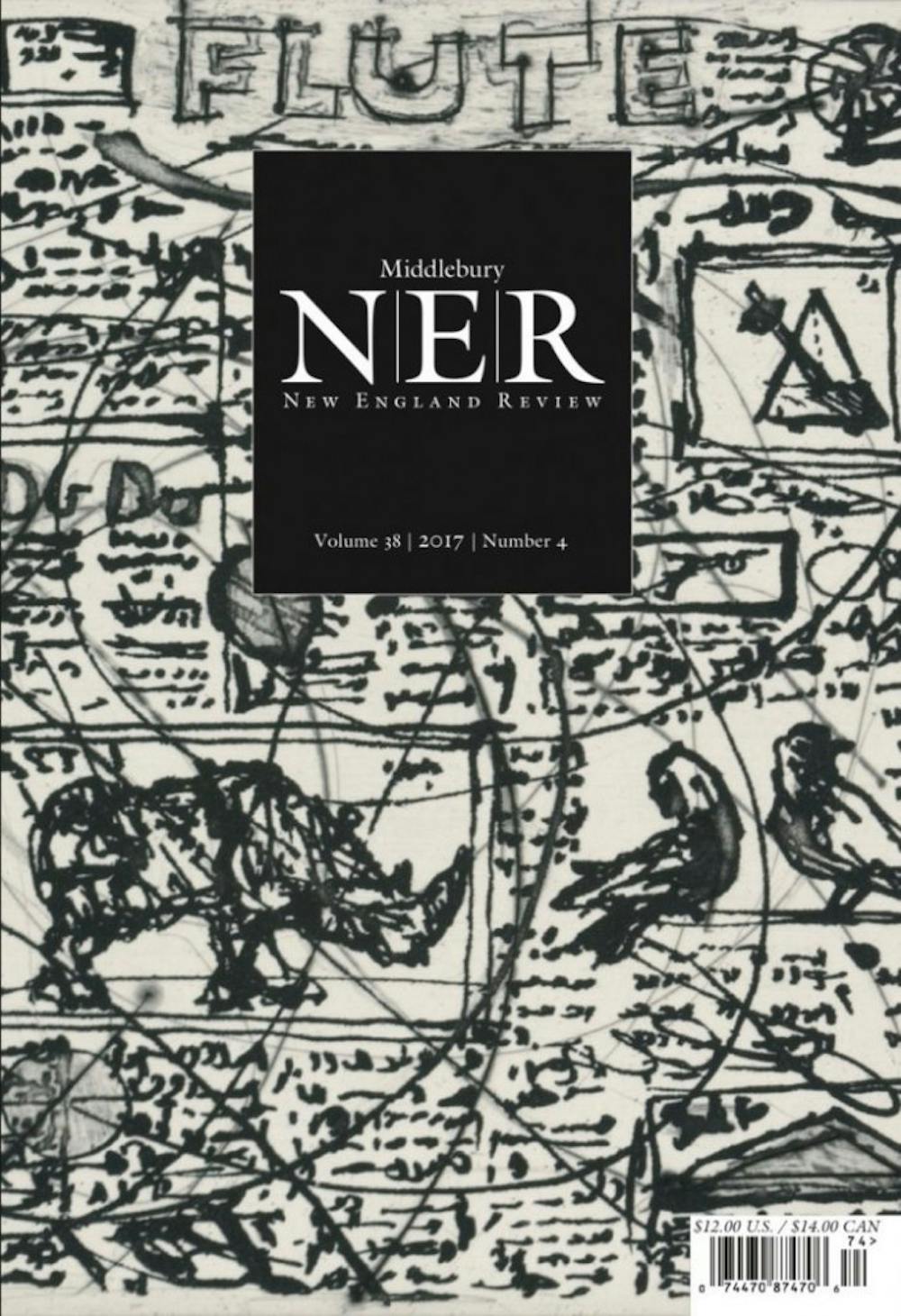When I arrive, it is tea time.
“It’s mango black tea,” Carolyn Kuebler ’90 says. She offers me local honey before leading me back to her office. The surprisingly sunny day lends the office a brighter mood than one might imagine of a literary magazine. Her desk is strewn with papers, notes and the most recent issue of the quarterly. The cover is a black-and-white sketch-like piece of artwork; a rhinoceros and birds, scribbles like words and a metronome.
Carolyn Kuebler has been with the New England Review (NER) since 2004. She worked as managing editor until 2014 when she became editor after Stephen Donadio returned to full-time teaching at Middlebury College. Her job includes reading submissions, handling the budget of the magazine and organizing events.
“I do a lot of reading,” Kuebler said when I ask her to describe her job. “And looking for great new content. Sometimes we pursue writers. When we want to do international sections, we’ll track down writers of different nationalities, who speak different languages. We have to find some kind of literary ambassador for those sections because we don’t tend to get a lot of submissions from people from say, China or South Africa or Germany. When we want to have more international content, we have to track that down.”
She is obliquely referring to the final issue of 2017, which featured South African writers.
In her editor’s note of the volume, Kuebler writes, “No one author--or even a dozen authors, as you’ll find here--can represent the voice of any nation. In South Africa, though, the idea of a national literature is particularly fraught, as the laws of apartheid, established to keep people ‘apart’ … created radically inequitable nations within nations.”
NER’s focus on South Africa came about by a series of happenstances, know-somebody-who-knows-somebodys and inquiries into the literature of the nation. Kuebler had hoped especially to publish translations of pieces written in languages other than English, considering South Africa is home to eleven official tongues.
That turned out, however, to be a challenge.
“So many writers in South Africa write in English even if they speak other languages,” she said. “It ended up being a real lesson for me.”
Due to a smorgasbord of political, socioeconomic, institutional and educational reasons, most of the work submitted had originally been written in English. So, unlike other issues the magazine has published, the South African issue is not translation-focused.
This lack of translation, however, does not detract from the poetry and prose of the South African writers who deal with themes of place, power and language. Even the cover art, “Magic Flute Book: Newspaper,” was done by a South African artist, William Kentridge.
While broad, the scope of the publication does not overlook its current home: Middlebury College. The college has published the magazine, and therefore been responsible for its budget and employees, for over 30 years.
“Unfortunately, I think NER goes largely unnoticed by most of the students at Middlebury,” said Robert Erickson ’18, one of two summer 2017 interns. “Most of us wouldn’t expect that we have one of the nation’s most well-respected literary magazines in our own backyard.”
Even with its seeming remoteness, however, the publication enjoys a bond between the college that publishes it as well as the town it finds itself in.
“Literary magazines add to the culture in ways that are beyond just the journal,” Kuebler said.
In recent years, NER has collaborated with the Mahaney Center for the Arts and Oratory Now to produce “NER Out Loud,” during which students read selections from the magazine. NER also hosts events that bring together local and student writers at places like Carol’s and the Marquis Theater for readings.
Hearing the poems and stories aloud, which granted the writings different, sometimes surprising reinterpretations, has inspired NER to continue the practice in the form of a podcast, which is currently in the works.
“We have some of our J-term interns and some Oratory Now students putting together readings,” she said. “Hopefully they’ll release that by the end of the semester.”
Another connection between the College and NER is their hiring of interns like Erickson during the regular fall and spring semesters as well as over the summer and J-term.
Erickson interned with Victoria Pipas ’18 this past summer, where they read submissions, worked on online content, conducted interviews and started some long-term projects for the publication.
“I think I came away with a new appreciation for just how difficult it really is to write good literature,” Erickson said. “As a literary studies and classics major at Middlebury, 99 percent of my reading consists of books that are generally acknowledged to be of high caliber and have ‘withstood the test of time,’ so to speak. But spending as much time as I did reading and discussing fiction submissions from writers with a range of talent levels helped me to develop the vocabulary necessary to explain why one piece might have succeeded where another failed, or what separated the ‘great’ stories from the simply ‘good’ ones.”
“In my view, one of the most impressive things about NER is their commitment to finding and publishing new talent,” he said. “Many literary magazines of NER’s caliber rely heavily on work acquired through a contract or an agent to fill their pages, but NER is committed to publishing fresh, new, exciting voices alongside more well-established ones. The Poetry Editor, Rick Barot, makes it a point to include one issue each year that exclusively features poets whom the magazine hasn’t published before. For NER, the work on the page is what earns a spot in the magazine; nothing else.”
This year, NER turns 40, and Kuebler said they have special events planned for the anniversary.
“We’re going to release different pieces from the archive that are not currently up on our website with introductions from the editors over the past decades,” she said. “For instance, the first managing editor has written a little piece about an essay that came out in 1980. It’s a way for people to meet all the people who have edited here in the past and to see some material New England Review published way back when.”
New England Review Celebrates 40 Years

Comments



